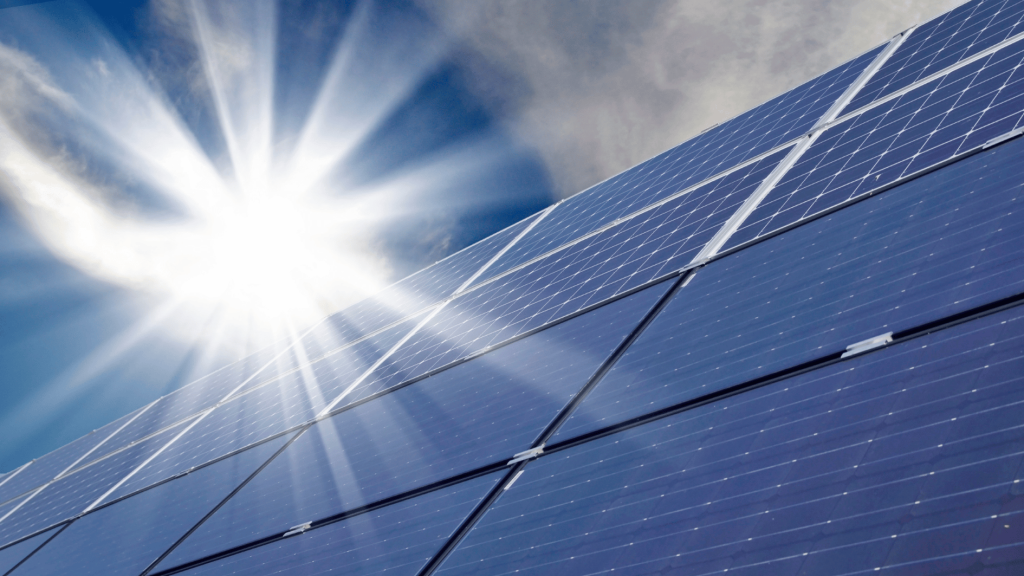Image source: Canva.com
By investing in solar power, West Virginians can lower energy costs, reduce their environmental impact, and contribute to the state’s economic diversification. But how well does West Virginia support solar energy adoption? Let’s explore the potential, policies, benefits, and challenges of going solar in the Mountain State.
Solar Potential in West Virginia
West Virginia receives approximately 190 sunny days per year, making solar energy a feasible option. While not among the sunniest states, modern solar panels are efficient enough to generate substantial electricity even on cloudy days. The state’s vast open spaces and rural properties are ideal for ground-mounted solar installations.
Vast open spaces – Many rural properties allow for large ground-mounted solar installations.
Advancing solar efficiency – Today’s solar panels work well in varied weather conditions, maximizing energy production.
Long-term savings – Even with average sun exposure, homeowners can expect substantial energy cost reductions over time.
Supportive Policies and Incentives
West Virginia offers several policies and incentives to encourage solar energy adoption:
Residential consumers generating up to 25 kW and industrial users up to 2 MW can participate in net metering, allowing them to earn credits for surplus energy sent back to the grid. This program is limited to 3% of the previous year’s peak demand.
A 30% federal tax credit is available for solar system installations in 2025, significantly lowering the upfront cost.
Solar Renewable Energy Certificates (SRECs)
Although West Virginia’s SREC market is smaller compared to other states, it still offers an opportunity for solar system owners to sell certificates for additional income.
Property Tax Exemption
Solar systems in West Virginia are exempt from property tax increases, making solar a more financially attractive option.

West Virginia’s Key Solar Incentives in 2024: A Breakdown
Economic and Environmental Benefits
Switching to solar power provides both financial and environmental advantages.
Lower Electricity Bills – Savings that Grow Over Time
With West Virginia’s electricity rates steadily increasing, solar panels offer a way to lock in predictable energy costs and avoid future price hikes.
- Immediate savings: Homeowners with solar panels see reduced electricity bills from the moment their system is installed.
- Long-term financial benefits: Most solar panels have a lifespan of 25–30 years, meaning decades of savings on electricity.
- Protection from rate increases: Utility rates in West Virginia have risen by nearly 15% over the past decade, and future increases are expected. Solar panels allow homeowners to generate their own power and avoid these fluctuations.
- Return on Investment (ROI): Most solar panel systems in West Virginia pay for themselves within 8–12 years, after which homeowners enjoy nearly free electricity for the rest of the system’s lifespan.
Energy Independence
- By generating their own electricity, solar panel owners depend less on power companies and more on their own energy production.
- Many rural homes and farms in West Virginia experience frequent outages or high delivery fees from utility companies. Solar power with battery storage ensures a reliable energy source, even during grid failures or extreme weather events.
- Pairing solar panels with battery backup systems allows homeowners to store excess power for use at night or during power outages, further reducing dependency on utility providers.
Environmental Impact
- Coal still dominates West Virginia’s energy mix, but switching to solar significantly cuts carbon emissions, helping meet state and national clean energy goals.
- Coal-fired power plants contribute to air pollution and water contamination. Solar energy produces no air pollutants and does not require water for operation, unlike traditional power plants.
- Investing in solar energy helps create a healthier environment for future West Virginians while reducing reliance on nonrenewable energy sources.
Job Growth
- Solar panel installations, maintenance, and repairs require skilled workers, providing job opportunities for electricians, engineers, and technicians.
- More homeowners and businesses adopting solar energy leads to increased demand for local solar companies, stimulating entrepreneurship and economic investment.
- Expanding solar energy creates opportunities for new energy infrastructure projects, benefiting West Virginia’s economy at a larger scale.
Community Solar: A Flexible Alternative
Community solar programs are emerging in West Virginia, providing alternatives for residents who cannot install rooftop panels. These programs allow individuals to subscribe to a shared solar project and receive credits on their electricity bills, expanding access to solar energy for renters and those with unsuitable rooftops.

How It Works
- Homeowners subscribe to a shared solar project instead of installing panels on their own property.
- Participants receive energy credits on their utility bills based on their share of the solar farm’s output.
- Great for renters and homeowners with shaded roofs who still want to support solar energy.
Challenges to Solar Adoption
Despite its potential, West Virginia faces challenges in solar adoption:
Limited State Incentives
The absence of robust state-specific solar rebates or grants may deter some residents from investing in solar energy.
Coal Industry Influence
The state’s historical reliance on coal can create resistance to renewable energy transitions.
Grid Limitations
In rural areas, grid infrastructure may require upgrades to accommodate solar systems.

The Solar Panel Payment Dilemma: Solved!
How to Get Started with Solar in West Virginia
Assess Your Property
Evaluate your roof’s condition, orientation, and sunlight exposure, or consider ground-mounted systems for larger properties.
Find a Trusted Installer
Work with certified solar installers experienced with West Virginia’s permitting processes and regulations.
Explore Financing Options
Consider loans, leases, or power purchase agreements (PPAs) to make solar installations more affordable.
Utilize Incentives
Take full advantage of net metering and the federal tax credit to maximize savings.
Is Solar a Smart Choice in West Virginia in 2025?
West Virginia is emerging as a promising location for solar energy. While the state’s solar market is still developing, its natural potential, supportive policies, and growing interest in renewable energy make it an attractive option for homeowners and businesses. By investing in solar power, West Virginians can lower energy costs, reduce their environmental impact, and contribute to the state’s economic diversification. Now is a great time to explore the opportunities solar energy offers in the Mountain State.





